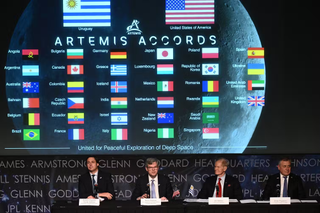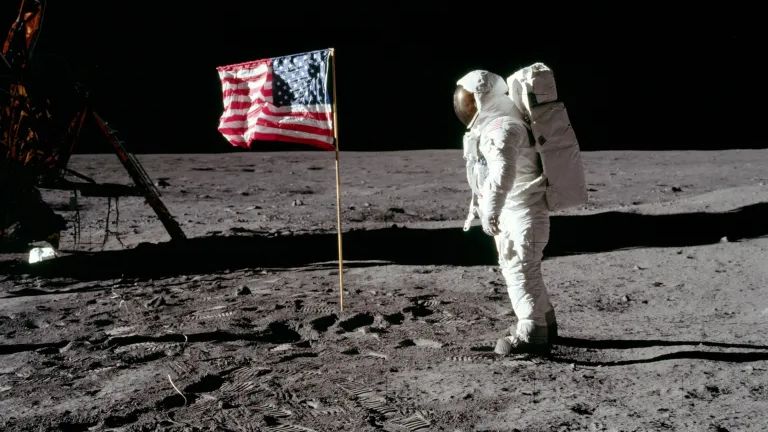This article was originally published at The conversation. The publication contributed the article to space.com's Expert Voices: OP-Ed & Insights,
Wayne n white jr Consults with one space technologies inc. He is a member and former director of the national space society and an associate fellow of aiaa.
Private Citizens and Companies May One Day Begin to Permanently Settle Outer Space and Celestial Bodies. But if we don't enact governing laws in the meantime, space setters may face legal chaos.
Many wars on earth Start over territorial disputesIn order to avoid such disputes in outer space, nations should consider enacting national laws that Specify the extent of etc.
I have been researching and writing about space law for over 40 years. Through my work, I've Studied Ways to Avoid War and Resolve Disputes in Space.
Property in Space
Space is an International Area, And Companies and Individuals are free to land their space objects-Including satellites, human-crewed and robotic spacecraft and Human -inhabited facilities and Human -inhabited facilities and Conduct Operations Anywhere They please. This includes both outer space and celebrity bodies such as the moon.

The 1967 Outer space treatment Prohibits Territorial Claims in OUTER Space and on Celestial Bodies in Order to avoid disputesBut without National Laws Governing Space Settlers, A Nation Might Attempt to Protect Its Citizens 'And Companies' Interests by withdrawing from the Treaty. They could then claim the territory where its citizens have placed their space objects.
Nations Enforce Territorial Claims Through Military Force, which would likely cost money and lives. An alternative to territorial claims, which i've been investment and have come to prefer, would be to enact real Property Rights That are consistent with the outer space treatment.
Territorial Claims can be asserted only by National Governments, While Property Rights Apply to Private Citizens, Companies and National Governments that Own Property. A Property Rights Law Belt Specific How MUCH Authority Settlers have and Protect their investments in OUTER Space and on Celestial Bodies.
The outer space treatment
In 1967, The Outer Space Treaty Went into effectAs of January 2025, 115 Countries Are party to this treatment, including the united states and most nations that have a space program.
The outer space treatment outlines Principles for the Peaceful Exploration and Use of Outer Space and Celestial Bodies. However, the treatment does not specify how it will apply to the Citizens and Companies of Nations that are parties to the treatment.
For this reason, the outer space treatment is larger Not a self-executing treatmentThis means US courts cannot apply the terms of the treatment to individual citizens and companies. For that to Haappen, the united states would need to enact national legislation that explains how the terms of the Treaty Apply to Nongoveernmental Entities.
One article of the outer space treatment Says That Participating Countries Should Make Sure That All of Their Citizens' Space Activities Comply with the Treaty's terms. Another article Then Gives these nations the authority to enact laws governing their citizens 'and companies' private space activities.
This is particularly relevant to the us, where commercial activity in space is Rapidly Increasing,
Un charter
It is important to note that the outer space treatment requires participating nations to comply with international law and the United Nations Charter,
In the un charter, there are two international law concepts that are released to property rights. One is a country's right to Defend ItselfAnd the other is the Noninterfererance Principle,
The International Law Principle of noninterference Gives nations the right to exclude others from their space objects and the areas where they have ongoing activity.
But how will nations apply this concept to their private citizens and companies? Do individual people and companies have the right to exclude others in order to prevent interference with their activities? What can they do if a foreign person interferes or causes damage?
The noninterfererance Principle in the un Charter Governs Relations Between Nations, Not Individuals. Conseaquently, us courts likely wouldn't enforce the noninterfererance print in a case involving two private parties.
So, Us Citizens and Companies do not have the right to exclude others from their space objects and areoing of ongoing activity unless the US enacts leggislation giving them that.
Us laws and regulations
The united states have Recognized the need for more specific laws to govern private space activities. It has sought international support for this effort through the nonbinding artemis accords.

As of January 2025, 50 nations have signed the artemis accords.
The accordes explain how important components of the outer space treatment will apply to private space activities. One Section of the Accords Allows for safety zonesWhere Public and Private Personnel, Equipment and Operations are protected from Harmful Interference by Other People. The rights to self-defense and noninterference from the un charter provide a legal basis for safety zones.
Aside from Satellite and Rockt-Launch Regulations, The United States have enacted only a more laws-including the Commercial Space Launch Competitiveness Act of 2015 – to Govern Private Activities in Outer Space and on Celestial Bodies.
As part of this act, any us citizen collecting mineral resources in OUTER Space or on Celestial Bodies have a right to own, transport, use and sell theSE Resources. This act is an example of national legislation that Clarifies How the Outer Space Treaty Applies to Us Citizens and Companies.
Property Rights
Enacting Property Rights for Outer Space Delhi make it clear what rights and obligations property owners have and the expert of their authority over their property.
All nations on Earth has a form of property rights in their legal systemsProperty Rights Typically Include the Rights to Possesses, Control, Develop, Exclude, Enjoy, Sell, Lease and MortGage Properties. Enacting Real Property Rights in space would create a Marketplace for Buying, Selling, Renting and Mortgaging Property.
Because the outer space treatment prohibits territorial claims, space property rights would not negassarily be “Land Grabs.” Property rights would operate a little difference in space than on Earth.
Property rights in space would have to be Based on the authority That the outer space treaty gives to nations. This authority allows them to governe their citizens and their assets by enacting laws and enforcing them in their courts.
Space Property Rights Today Safety Zones Around Property to Prevent Interference. So, people would have to get the property owner's permission before entering a safety zone.
If a US Property Owner was to sell a space property to a foreign citizen or company, the space objects on the property should have to stay on the property or be replaced with the property ' Objects. That would ensure that the owner's country still has authority over the property.
Also, if someone transferred their space objects to a foreign citizen or company, the buyer would have to change their objects' International registrationWholes would give the buyer's nation authority over the space objects and the surrounding property.
Nations must likely avoid some territorial disputes if they enact real property laws in space in space that clealy describe how National Authority Over Property Changes were Sold. Enacting Property Rights Block Reduce The Legal Risks for Commercial Space Companies and Support the Permanent Settlement of Outer Space and Celestial Bodies.
Us Property Rights Law Cold also contain a reciprocity provisionWhich would encourage other nations to pass Similar laws and allow participating counts to mutually recognize Each other's property rights.
With a reciprocity provision, Property Rights Cold Support Economic Development as Commercial Companies Around the World Begin to Look To Outer Space as the Next Big Area Of Economic Growth.



